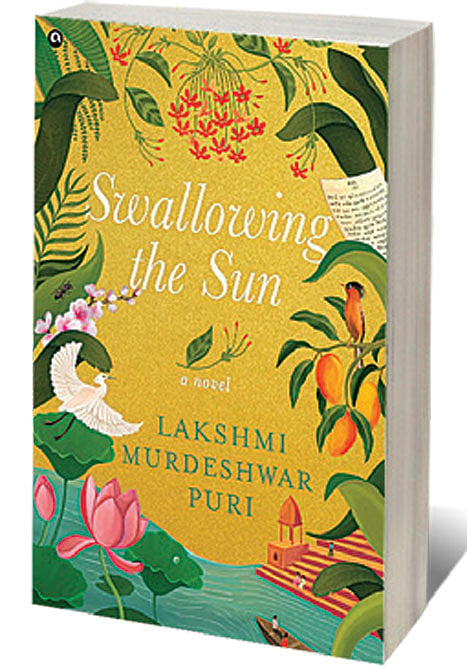The Passage of India

A SEASONED INDIAN Foreign Service diplomat Lakshmi Murdeshwar Puri has held many positions of power, most recently as the United Nation’s Assistant Secretary General. Her debut novel explores a few of the themes which she has likely dealt with in her professional life, from breaking boundaries to female assertion to the eternal faceoff between fate and will. Swallowing the Sun, a sweeping epic, can be read as historical fiction, a feminist statement, a family saga and a coming-of-age tale.
It is the story of two young girls, Kamala and Malati, from a remote village in Maharashtra. Their father allows them to play with boys and work on the mango fields, and he wants to educate them. Their elder sister is married off at the age of 15, as the second wife of a feudal Maratha minister of a local maharaja. The father hesitates to give his daughter in marriage to a man who already has a wife and a daughter, but is persuaded to do so.
The book maps an important period of change in India. In the beginning of the 20th century, girls were still married off before puberty, and marriages of young girls to older men were common. But it was also a time when girls started to get educated and emerge as the torchbearers of a new India.
The hero of the story is the father, who fights dacoits, transforms a barren land into a productive village, and defies orthodoxy by supporting his daughters. He dares to challenge the laws of his society, where girls are married off as children. He even enrols his daughters in Elphinstone College, Bombay. Through his character, Puri makes an important comment that feminism is not only the domain of women, but that men play an equally important role in female emancipation.
Openomics 2026: Continuity and Conviction
06 Feb 2026 - Vol 04 | Issue 57
The performance state at its peak
Kamala and Malati become paying guests of Mohan Kaka and his wife Hema Kaki, a talented musician suppressed by her husband. But the girls persuade Mohan Kaka to let his wife sing again, at a time when women could not sing in public. Malati later takes up a job in Banaras Hindu University, where she is torn between the paths of revolution and peaceful satyagraha, at a time when India is waking up to the idea of freedom. The girls flower into adulthood in Bombay and Banaras, fighting trials and tribulations with gusto. The novel’s heroine, notably the tough Malati, stands out among a galaxy of strong female characters. Throughout, the novel shows how characters rise above their circumstance, and its title suggests how the unattainable can be attained, where everyday people can become heroic freedom fighters.
A strong feminist streak runs through the story. Malati is to be admired for daring to break convention, choosing her husband and even earning a salary to enable him to study, something unheard of in those days. The sisters break many glass ceilings. Malati has a child and, thereafter, chooses to become a housewife. At one point she starts doubting her husband’s fidelity. She has a daughter and, 16 years later, gives birth to a son.
A few inexplicable situations weigh down the text, such as a young woman dying a horrible death, a niece who becomes a famous actress and then a sanyasi. But such occurrences do happen in India. The numerous characters and incidents can confuse a reader, and the abrupt end hints, perhaps, at a sequel.
The story is interspersed with poetry in Marathi, and its English translations, which bring to light beautiful moments in an otherwise volatile story. Puri, a student of history, grew up with parents who lived poetry, and this influence seeps through her novel. Swallowing the Sun serves as an interesting reminder of an India, which passed from colonialism to democracy, from the suppression of women to their emancipation. Puri’s novel is both a coming-of-age of its characters and of India.

